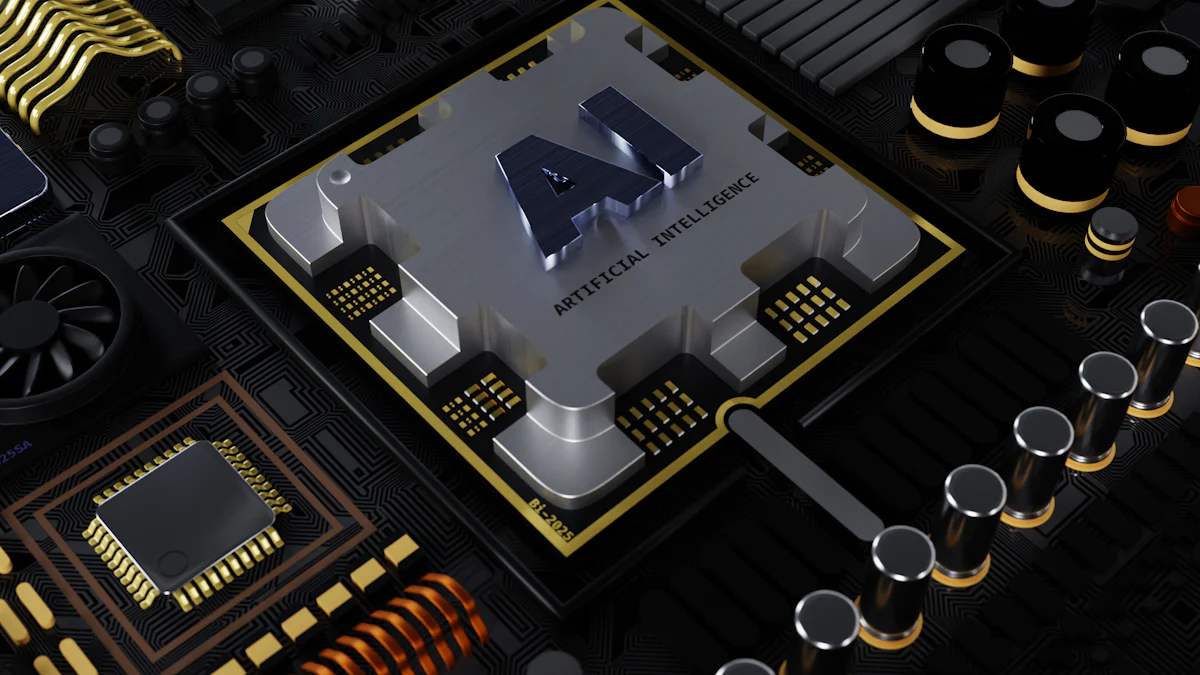Generative AI's Future: Trends, Challenges, and Opportunities

Generative AI, a celebrated branch of artificial intelligence, has rapidly evolved over the past decade. It plays a crucial role in shaping technological advancements by understanding human intent and creating diverse content, including text, images, and videos. The Future of Generative AI holds immense potential for transforming industries through applications like content generation and design. Understanding its trajectory is vital for harnessing its capabilities and addressing challenges that may arise.
Understanding Generative AI
Definition and Basics
What is Generative AI?
Generative AI refers to a subset of artificial intelligence that focuses on creating new content. This content can range from text and images to music and videos. Unlike traditional AI, which analyzes data to make predictions or decisions, generative AI produces original outputs by learning patterns from existing data. It mimics human creativity by generating content that appears authentic and innovative.
Key Technologies Involved
Several key technologies drive generative AI. Neural networks, particularly deep learning models, play a crucial role. These models learn complex patterns in data, enabling them to generate realistic outputs. Another essential technology is the Generative Adversarial Network (GAN), which consists of two neural networks working together. One network generates content, while the other evaluates its authenticity. This process improves the quality of the generated content over time.
Historical Context
Evolution of Generative AI
The evolution of generative AI traces back to the early days of artificial intelligence. In the 1950s, AI began to take shape, laying the groundwork for future advancements. A significant milestone occurred in 1961 with the creation of ELIZA, the first instance of generative AI. ELIZA could simulate conversations using pattern matching and substitution methodology, showcasing the potential of AI to generate human-like interactions.
Milestones in Development
Generative AI has achieved several milestones throughout its development. Alan Turing, a pivotal figure in AI history, played a crucial role in cracking the Enigma code in 1939. This achievement marked a significant step in AI's evolution. Over the years, advancements in algorithms and computing power have propelled generative AI forward. Today, it continues to evolve, integrating with other technologies and expanding its applications across various industries.
Current Trends in Generative AI
Technological Advancements
Breakthroughs in Algorithms
Generative AI has experienced remarkable progress due to breakthroughs in algorithms. Researchers have developed advanced neural networks that can produce realistic and creative outputs. These models have evolved from basic chatbots to sophisticated systems capable of composing music and generating lifelike portraits. The Future of Generative AI will likely see even more sophisticated algorithms, enhancing the quality and authenticity of generated content.
Integration with Other Technologies
The integration of generative AI with other technologies has opened new avenues for innovation. By combining AI with fields like augmented reality and virtual reality, developers create immersive experiences that captivate users. This synergy enhances the capabilities of generative AI, allowing it to perform tasks that were once unimaginable. The Future of Generative AI will continue to explore these integrations, leading to more versatile applications.
Industry Applications
Use Cases in Various Sectors
Generative AI finds applications across a wide range of industries. In marketing, companies use AI to create personalized content that resonates with their audience. The design industry benefits from AI's ability to generate new materials and concepts. In healthcare, AI assists in drug discovery by simulating molecular interactions. The Future of Generative AI promises to expand these applications, offering innovative solutions to complex problems.
Impact on Business Models
The impact of generative AI on business models is profound. Companies leverage AI to streamline operations and enhance productivity. By automating content creation, businesses reduce costs and improve efficiency. The Future of Generative AI will likely transform traditional business models, encouraging organizations to adopt AI-driven strategies. This shift will enable companies to stay competitive in an ever-evolving market landscape.
Challenges Facing Generative AI
Technical Challenges
Data Quality and Availability
Generative AI relies heavily on vast amounts of data to function effectively. The quality and availability of this data pose significant challenges. High-quality data ensures that AI models produce accurate and reliable outputs. However, obtaining such data can be difficult. Many datasets contain errors or biases, which can lead to flawed AI outputs. Additionally, some industries lack sufficient data, limiting the potential of generative AI applications. Ensuring access to diverse and high-quality datasets remains a critical hurdle for developers.
Model Complexity and Scalability
The complexity of generative AI models presents another challenge. These models often require substantial computational resources to operate. As models become more sophisticated, they demand even more processing power and memory. This requirement can limit the scalability of generative AI solutions. Smaller companies or organizations with limited resources may struggle to implement these advanced models. Developers must find ways to optimize models, making them more efficient and accessible to a broader range of users.
Ethical and Social Concerns
Bias and Fairness
Bias in AI models is a pressing ethical concern. Generative AI learns from existing data, which may contain inherent biases. These biases can manifest in the AI's outputs, leading to unfair or discriminatory results. For example, AI-generated content might favor certain demographics over others. Addressing bias requires careful examination of training data and the implementation of fairness measures. Developers must prioritize creating AI systems that produce equitable and unbiased outcomes.
Privacy and Security Issues
Privacy and security issues also challenge the development of generative AI. AI models often require access to sensitive data, raising concerns about data protection. Unauthorized access or misuse of this data can lead to privacy violations. Additionally, AI-generated content can be used maliciously, such as creating deepfakes or spreading misinformation. Ensuring robust security measures and ethical guidelines is essential to prevent misuse and protect individuals' privacy.
Opportunities for Growth and Innovation

Generative AI stands at the forefront of technological evolution, offering vast opportunities for growth and innovation. As industries continue to explore its potential, the Future of Generative AI promises to reshape markets and foster groundbreaking advancements.
Emerging Markets and Applications
New Industries Benefiting from AI
Generative AI is not limited to traditional sectors; it is paving the way for new industries to emerge. For instance, the entertainment industry leverages AI to create immersive experiences in gaming and virtual reality. AI-generated content enhances storytelling by producing dynamic narratives and lifelike characters. In the fashion industry, designers use AI to generate unique patterns and styles, revolutionizing the creative process. The Future of Generative AI will likely see more industries adopting these technologies, leading to innovative products and services.
Potential for Disruptive Innovations
The potential for disruptive innovations with generative AI is immense. AI models can generate synthetic data, which businesses use to train other AI systems without compromising privacy. This capability opens new avenues for research and development. In healthcare, AI-generated simulations assist in drug discovery and personalized medicine, offering solutions that were previously unattainable. The Future of Generative AI will continue to drive such innovations, challenging existing paradigms and creating new opportunities for growth.
Collaboration and Research
Interdisciplinary Partnerships
Collaboration across disciplines is crucial for advancing generative AI. Experts from fields like computer science, psychology, and design work together to develop AI systems that understand and replicate human creativity. These interdisciplinary partnerships foster a holistic approach to AI development, ensuring that models are both technically sound and ethically responsible. The Future of Generative AI will benefit from these collaborations, leading to more robust and versatile applications.
Open Source and Community Efforts
Open-source initiatives and community efforts play a vital role in the development of generative AI. By sharing resources and knowledge, developers accelerate innovation and democratize access to AI technologies. Open-source platforms allow researchers to build upon existing models, enhancing their capabilities and expanding their applications. The Future of Generative AI will thrive on these collaborative efforts, driving progress and ensuring that AI benefits society as a whole.
"AI research focuses on expert systems, rule-based systems designed to mimic human expertise in specific domains."
This quote highlights the importance of expert systems in AI research, emphasizing the need for collaboration and shared knowledge. As the Future of Generative AI unfolds, these principles will guide its evolution, ensuring that AI continues to innovate and transform industries.
The Future of Generative AI holds immense promise, with its potential to revolutionize industries and enhance human creativity. As generative AI continues to evolve, it will likely lead to machines that think and reason like humans, as proposed by Turing. This evolution will drive technological advancements and open new avenues for innovation. However, addressing challenges such as data quality, bias, and privacy is crucial. By overcoming these hurdles, society can fully harness the opportunities presented by generative AI. Continued exploration and collaboration will ensure that the Future of Generative AI benefits all.
See Also
The Future of Relationships in the Age of Generative AI
The Future of Innovation and Creativity: Generative AI Perspective
Essential Generative AI Vocabulary for Professionals
